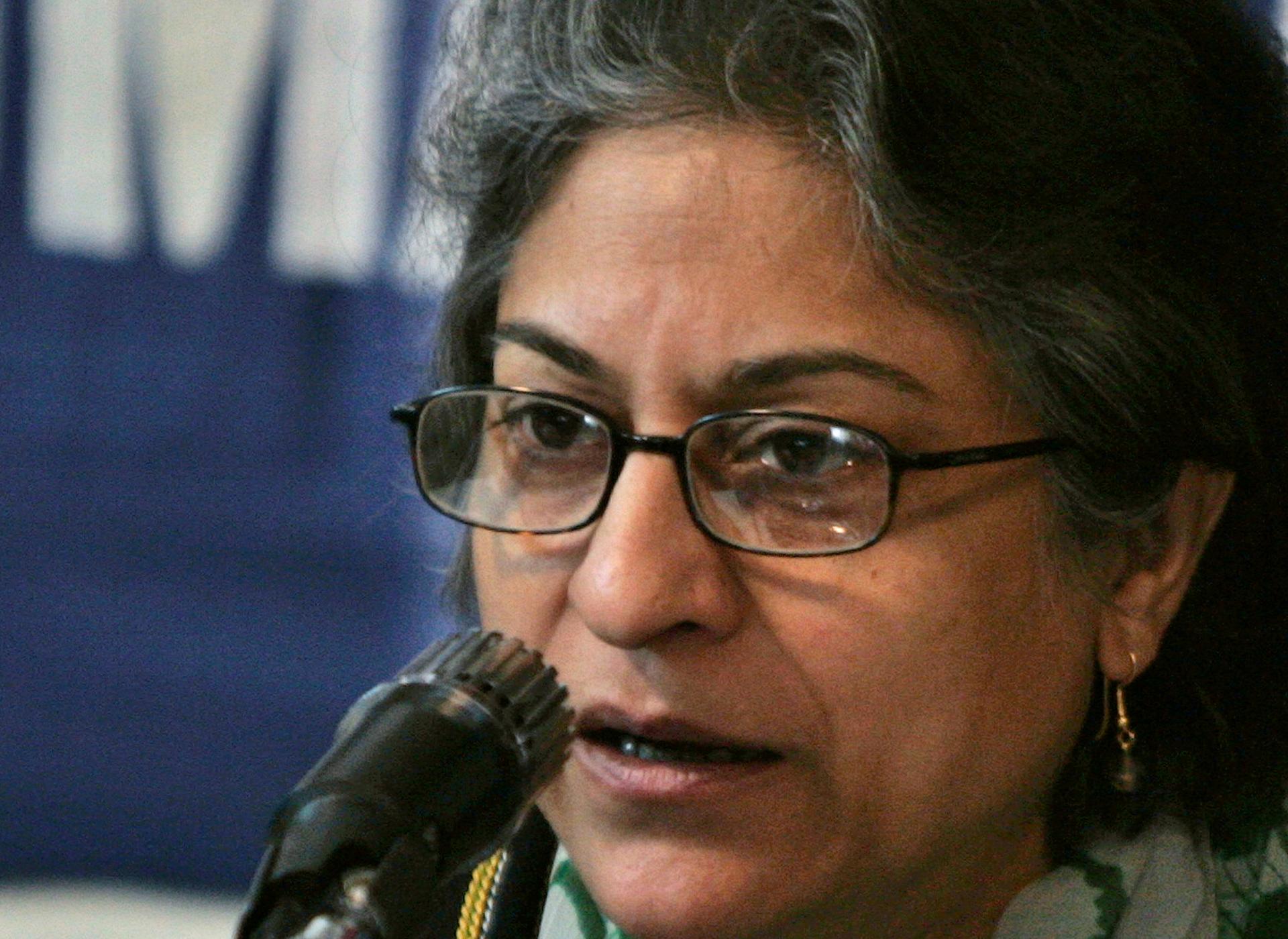Asma Jahangir speaks during a news conference in Islamabad on Jan. 25, 2007.
Leading Pakistani human rights lawyer and social activist Asma Jahangir died on Sunday in Lahore. She was 66.
A champion of democracy, Jahangir raised the voices of the marginalized. From movements to law, she inspired many to speak up — and loudly.
Bustle's politics editor, Mehreen Kasana, says that Asma Jahangir's influence shaped so much of what she's become today. And it started with parliamentary debate.
Marco Werman: So, growing up, what were your impressions of Asma Jahangir?
Mehreen Kasana: I think one of the first things I remember about her, back then in like seventh grade, was my father just introduced me to parliamentary debating, which is a huge, huge activity in Pakistani schools and, you know, universities. Teams come in from Turkey, from India, from China, from Iran, and it gets really intense. And so, many people look for their favorite people — you know, if you ever got into speeches — you always looked at someone and thought, "I want to talk like this person." I’d look at her and I’d think I really want to talk with that kind of force.
Where did you grow up?
I grew up in Virginia until I was about 10. And then after that, we moved to Pakistan [and] really big things happened: 9/11, the invasion of Afghanistan, the lawyers' movement, and Asma Jahangir had been one of the main figures in speaking against human rights violations at that time. And she sometimes seemed to be the only woman at the forefront, but she inspired so many other women to come forward and follow her past in terms of speaking up and not backing down at all.
"She dressed simply, she spoke loudly. And that, even in her biggest enemies, taught them this lesson that there is no silencing this woman."
You found inspiration in this one woman. What did she represent to you and your politics during this time?
I think for many people on the left like myself and other people — especially younger women — she's just representative of this idea of the possibility that no matter how male-dominated your field is, whether it's law, whether it's media, there's no excuse for you to think just because it's dominated by men, just because it's a patriarchal system, I have no means of getting up and speaking up. And she really she taught us that you don't really have to, you know, give into those kinds of conditions.
I'm talking about someone who — I work in journalism, right, so I have most of the time nothing to do with law. She's talking about holding media accountable. And I started my career in journalism in Pakistan in print at The Nation. And I would read her and I would remember that I never ever want to be on the receiving end of Asma Jahangir’s criticism in terms of being a bad journalist. That really kept me in line and I will never, ever be able to pay her back for that.
Do you have a good example of an episode where she did hold power accountable and how that inspired you?
She never limited her praxis, her philosophy, most importantly her empathy to know provincial borders. She never did that. She extended it to all provinces. Not only that she wasn't limited to Pakistan only, this is amazing about her. She spoke consistently in favor of liberating Kashmiris, liberating Palestinians.
This woman never really remained parochial or super nationalist about her idea of what liberation should look like. Her idea of the world was humanist, it was it was very kind, it was very loving and it was very, very just. I guess to me. I mean, I'm 28 and I sometimes feel really old I look at her and her energy, even until this point, it was just so impressive. I'd be thinking I really need to up my game if I want to reach that level.
Some of the reports and obituaries this weekend about Asma Jahangir suggest that even her most vociferous opponents had this respect for her. Why? Can you explain?
You could tell they respected how she would never back down. She didn't care what you called her. She dressed simply, she spoke loudly. And that, even in her biggest enemies, taught them this lesson that there is no silencing this woman.
So, Mehreen, you're here in the States, when you look at this block known as the resistance — as in resisting Donald Trump — a lot of people see it as somewhat diffuse and multipronged. What would be the Asma Jehangir critique of the US resistance? What do you think she would have said?
I think she would definitely say that you know, you need to start looking at … Donald Trump as a symptom of a much bigger part problem. He is not the sum total of what you're suffering right now. He is definitely a problem. In that sense, she would have some very uncomfortable truth to share with the resistance. And you would — I'm pretty sure, given her own political record — if you had a chance to read everything she was not exactly pro-Democrats, either. She definitely saw a problem with them.
What do you hope to implement from what you've learned from Asma Jahangir?
I guess the ultimate goal for anyone has been inspired by it is to try to be honest to be incredibly, incredibly humane, incredibly honest and not be afraid.
